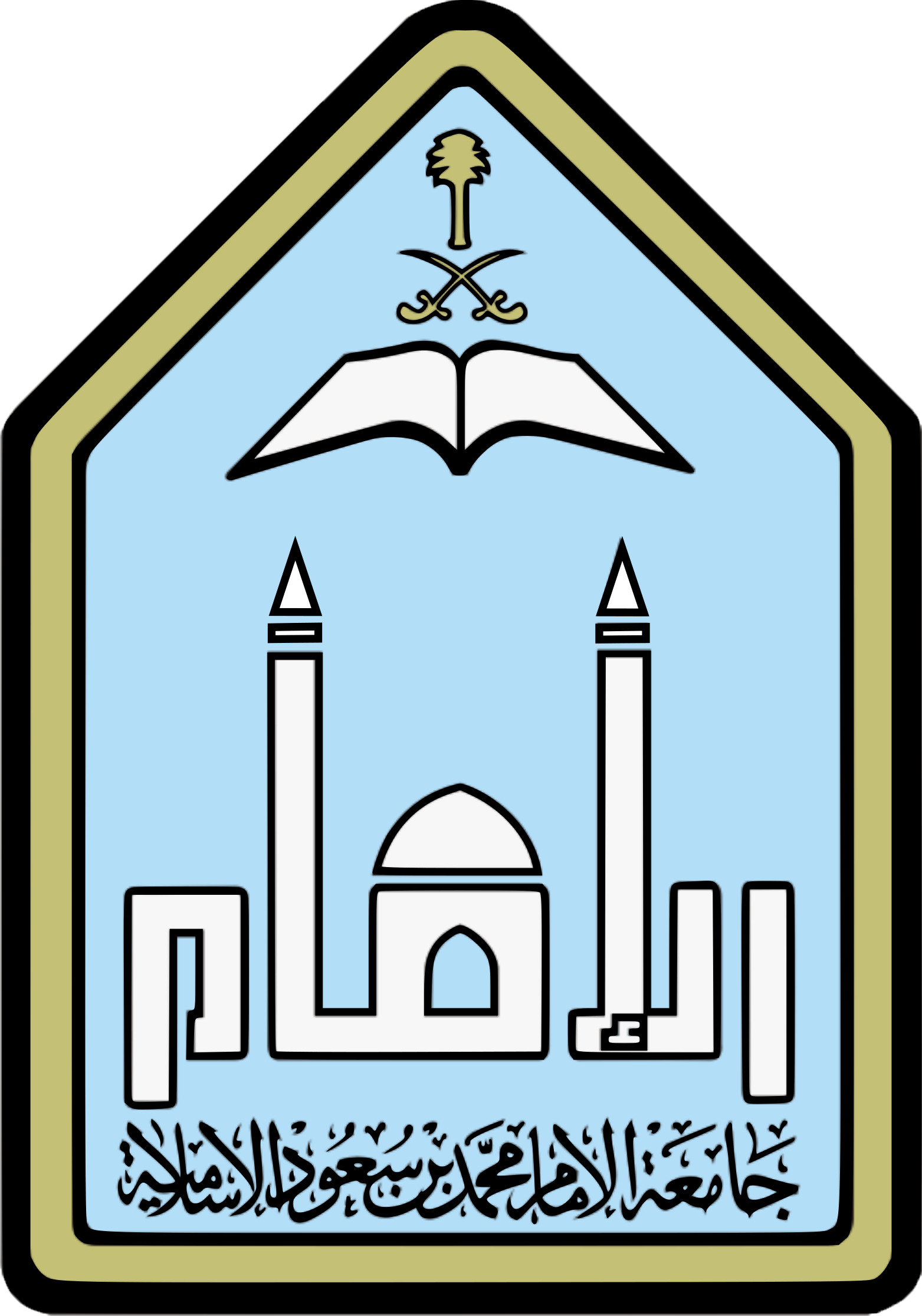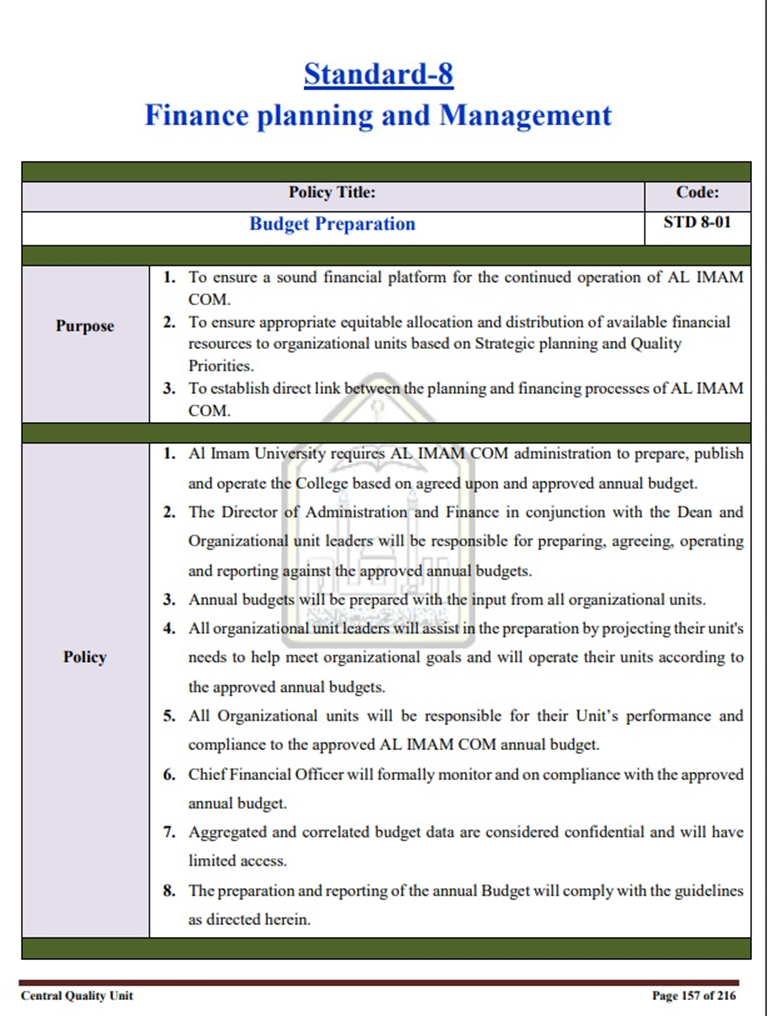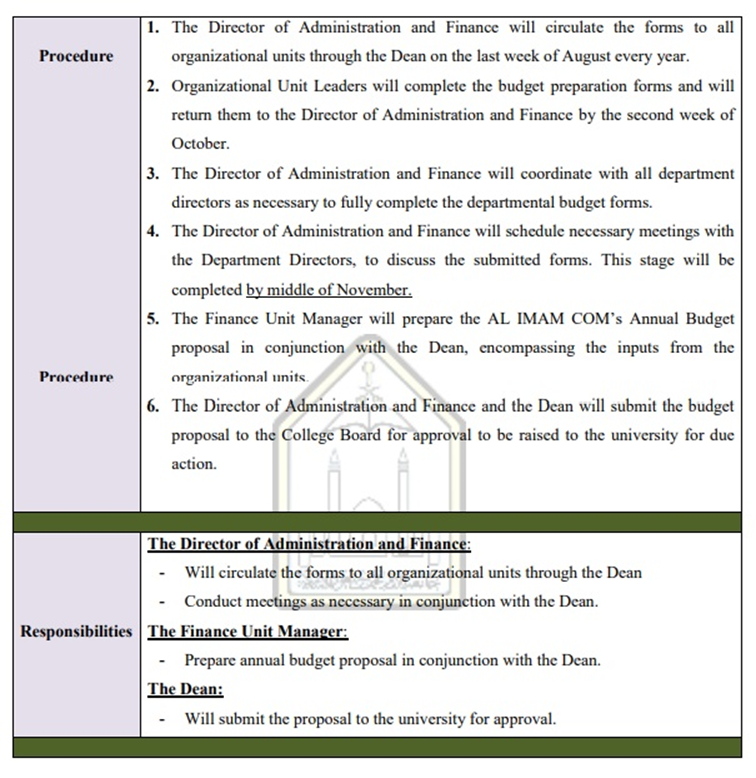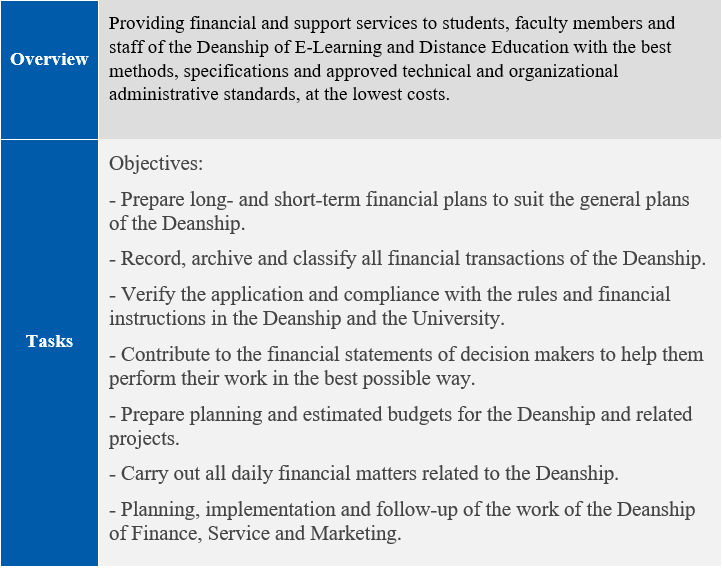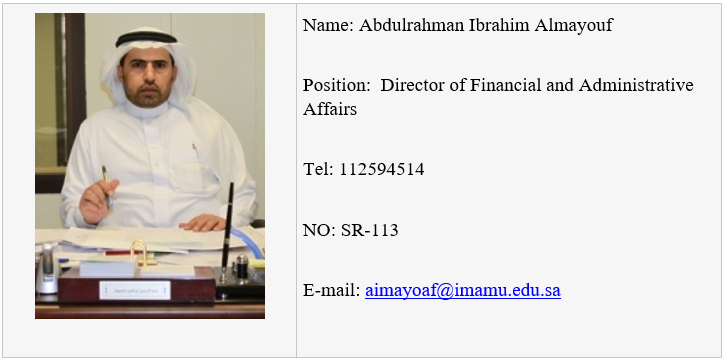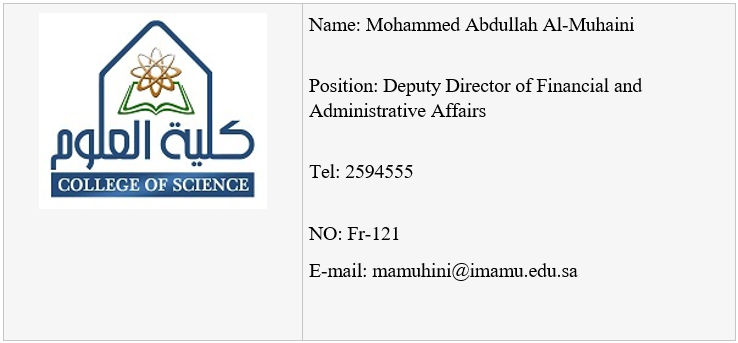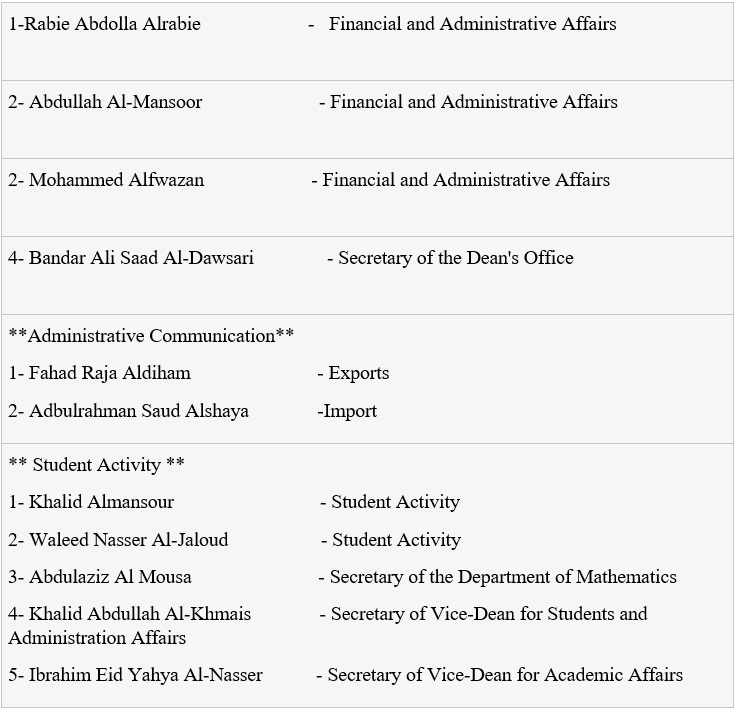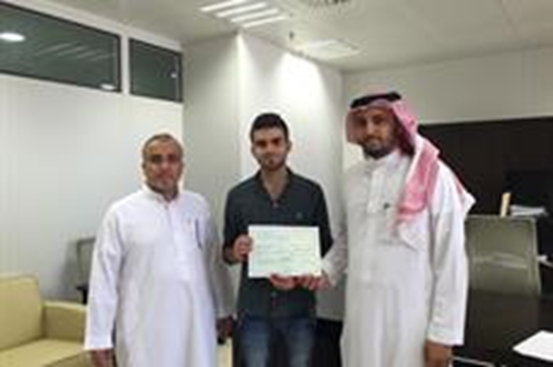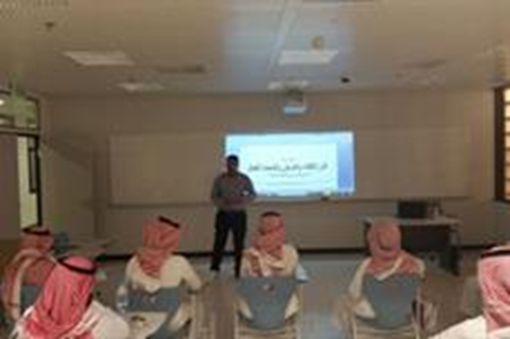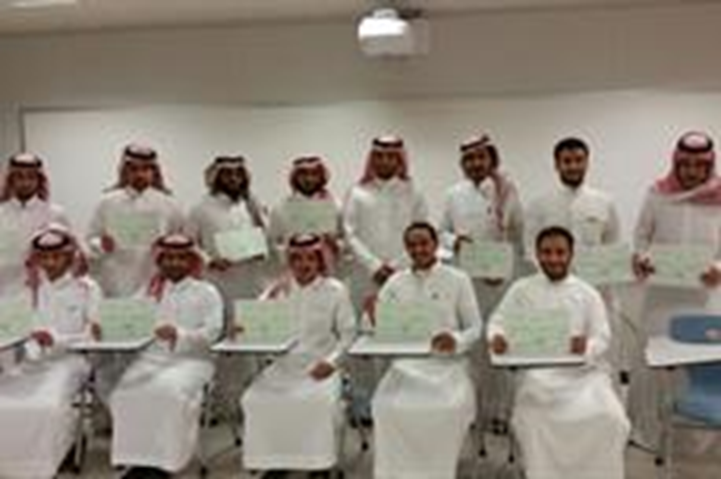Publication of university financial data
Introduction
The Imam Mohamed Ben Saud Islamic University created a department specialized in Islamic economics within the Riyadh College of law in 1977. The department was then renamed the department of economics and administrative sciences and divided into 3 branches: Economics, Business Administration and Accounting in 2001. When the department had all its constituents ready, the High consent came in 2006. to allow the department to be turned into an independent College.
A brief idea about the department
The first cohort in the bachelor’ degree program in finance and investment was admitted during the academic year 2008/2009. This first graduated cohort from the department was at the end of the year 2011/2012. The first female student’s cohort was admitted in the year 2009/2010. The Department of Finance and Investment has qualified teaching staff specialized in finance and investment.
The Department Vision
The department is designed to become a proficient center in teaching and scientific research involving the major of finance and investment. It also aims at responding to the industry needs of financial services and at boosting the university and helping at achieve its mission.
Mission of the department
The department strives to supply a motivating learning environment specialized in finance and investment. It also tries to acquire the best teaching personnel and scientific research team in order to habilitate specialists and professionals distinguished with knowledge, basic skills and legal views concerning the fields of finance and investment. All this is achieved through confirmed academic programs that enable students to be highly competitive in the labor market and to contribute to the well-being of society.
Objectives of the department
To prepare graduates equipped with knowledge, basic skills and legal views to work in the various sectors of finance and investment through bachelor degree programs and post graduate programs.
To meet the society’s needs for training and counselling in the fields finance and investment.
Promote knowledge in the specialty f finance and investment through higher education and scientific research.
Conditions of admission in the program
The College admits outstanding secondary education graduates. The following conditions are necessary for admission:
First, common conditions for university admission which are announced in the admission and registration services in all the Colleges.
Secondly, specific conditions for the College:
Success in the College Preparatory year.
Getting the required grades for the secondary education certificate and passing the capacity test.
Students are eligible to switch from other College programs to a major program in finance and investment based on the following conditions:
The student has to cover the academic curricula designed for the common levels (no less than 60 hours)
The student has to obtain at least 3.50 out of 5.00 as an average.
The student has to get the agreement of the department of finance and investment based on the capacity of the department and the result of the personal interview.
Organizational Structure:
Management Description:
It is linked to the Dean of Student Affairs, and aims to provide all financial and accounting services in the Deanship in accordance with the laws, regulations and instructions.
Objectives of the Department of Financial Affairs:
Ensure that all expenses are made based on financial regulations and instructions, and that they are organized according to an integrated automated system.
Provide appropriate financial facilities to support student activities.
Provide in-kind awards for student activities in the Deanship and the faculties of the University to confirm the communication links between the Deanship and the colleges at the University.
Tasks of the Financial Affairs Department:
With each beginning of a new financial year, the Deanship needs advances for the new academic year to be linked to the amounts of advances with the items of the Deanship, namely the item of office supplies, the item of sports and cultural activity, the item of educational supplies, and the item of clothing and equipment.
Prepare exchange orders for advances requests after they meet the full conditions.
Record advances in the advance book, and follow up on their payment.
Prepare the minutes of receipt and audit of the invoices for advances, and complete the rest of the procedures related to them.
Follow-up the supply processes (baptisms) and their contracts, and raise to the financial management of the disbursement.
Fill out the appointment allowance form for new employees in the Deanship, and send it to personnel affairs.
Follow-up assignments and outside the working hours of the Deanship staff.
Prepare and upload important performance documents and out-of-work affidavit forms, and submit it to personnel affairs.
Prepare exchange instructions, and conditions for receiving invoices.
Matching the account of advances with expenses.
Ensure before the end of each academic year that all advances are paid and that the supply period ends well in time.
Submit the needs of the Deanship with regard to applications that do not meet the conditions for disbursement from the warehouse or advances to the Furnishing Committee at the University.
Fill out the cards of the disbursement orders and receive the custody.
Registration and classification of Deanship control cards, especially those in the warehouse or delivered to employees.
Receive the Deanship's transactions regarding the financial management, and follow up its procedures.
Follow up the claims of Saudi Airlines (passenger tickets), complete them and send them to the financial department of the university.
College of Science congratulate Dr Osamah Abdulrahman Aldaghri (Assistant Professor, Department of Physics ) for being appointed by Dr. Fawzan bin Abdul-Rahman Al-Fawzan, The university Acting Rector, to become the new Vice Dean of Administration and financial Affairs starting from 2/05/2015
Research project finance unit
Receiving requests/proposals for research projects submitted by university staff.
Send proposals for approved research projects for arbitration.
Processing contracts for approved research proposals.
Coordination with research centres and units.
Follow-up on research projects.
Filing requests for the disbursement of financial dues to arbitrators and members of research teams.
College research units
Propose the annual research plan at the college/institute, and prepare the necessary draft budget.
Preparing the unit's estimated budget includes expenditures on various scientific research expenses: project financing, scientific publication, and scientific programs, and elevating them to the deanship of scientific research.
Activating the strategic plan for scientific research in the college/institute.
Organizing activities that serve research at the college/institute, such as: lectures and seminars.
Advising researchers and scholars on scientific research methodologies.
Receiving the requests of faculty members for project financing and study in terms of scientific content, novelty and innovation, ensuring the completion of its regulatory framework, proposing appropriate arbitrators, and making recommendations through confidential records of the dean of scientific research.
Study research projects and studies that require entities outside the university, select researchers and follow up on their implementation, and propose rewards to those who do so in accordance with the rules governing it.
Proposal to publish scientific letters, systematic, scientific and cultural books, . . . other vessels available for publication, to be submitted to the board of deanship of scientific research for consideration.
Annual reporting on the unit's activities and programs.
Preparing databases for projects funded in the unit and scientific production published by the unit.
College research centers
Each of the pillar's research centres is managed by the centre's board and the director of the centre.
a. the functions and powers of the center council
All matters relating to it are considered by the centre's board.
Propose the annual research plan and prepare the necessary draft budget for it.
Study and follow-up of faculty research projects
Study research projects, studies that require outside the university and select researchers, follow up on their implementation, and propose rewards to those who do so in accordance with the rules governing it.
Recommend that the planned research budget be disbursed within the limits of the governing powers.
Study the annual report, the final account, and the draft budget of the center and submit it to the competent authority.
Study what is referred to him from the board of deanship of scientific research.
b. the functions and powers of the director of the center
Supervising and monitoring the research work of faculty members, their referees, and assistant researchers, including direct supervision of the center's administrative and technical body.
Contact scientific departments, motivate faculty members to research, coordinate their research projects, provide the means and capabilities to help prepare them, and deploy them as efficiently as possible.
Communication, coordination with other research centers within and outside the university in everything related to the nature of research prepared under the supervision of the center or prepared for entities outside the university.
Preparing the draft annual budget for the center's events, in preparation for its presentation to the center's board, and then submitting it to the university's competent authority.
Preparing the annual report on the center's activity and submitting it to the competent authority.
Research laboratory management
a. materials and equipment procurement unit
Follow-up requests for materials and equipment for funded projects and establish an independent special register for each project.
Receive and review purchase offers for each funded research project before they are approved.
Communicate with equipment suppliers.
Follow-up and control of advances spent to research centres and units.
Continue to receive all covenants for non-consumed equipment and materials after the completion of the funded projects.
b. Search lab databases
Supervising all the contents of research laboratories.
Provide the digital indicators needed to assess the performance of research laboratories.
Create databases of materials and equipment in all research laboratories.
Develop the management of research laboratories electronically.
Documenting the necessary statistics with materials and equipment and their budgets.
c. Follow-up of research laboratory committees:
Research laboratory processing committee.
Committee for the operation and maintenance of research laboratories.
Standing committee for radiation prevention and environmental pollution.
Student Extracurricular Activities Unit in the Vice-Deanship of the College for Administrative and Financial Affairs handed attendance certificates of a number of training courses to the participants. These courses were held during the second semester of the academic year 1436/1437 AH. Furthermore, they were organized by Mr. Abdulrahman Al-Dakheel, Lecturer in the Mathematics and Statistics Department, in cooperation with the supervisors of "I`dad" Program in the Deanship of Community Service and Continuing Education. Three courses were held, which are:
SPSS Data Analysis Course, attended by 15 students.
Academic Research Skills Course, attended by 10 students.
Administrative Skills Course, attended by 13 students.
The attendance certificates were distributed by Dr. Osama Abdulrahman Al-Daghri, Vice-Dean of the College of Science for Administrative and Financial Affairs. Dr. Jamal Al-Hyajah, Supervisor of "I`dad" Program in the Deanship of Community Service and Continuing Education, and Dr. Anis Ghorbal, Presenter of the Data Analysis Course, attended the ceremony. In the beginning of the ceremony, Dr. Osama Al-Daghri talked about the outstanding role of such courses and their importance in refining university student's personality as they represent extra important skills. He also clarified that they would not hinder students' educational achievement. Then, he asked students to urge their colleagues to attend such courses held by the University during their University career and thanked them and the trainers who presented these courses, and who were:
Dr. Anis Ghorbal.
Dr. Isam Obaid.
Dr. Khalid Al-Mulhim.
He also extended special thanks to Mr. Abdulrahman Al-Dakheel, Supervisor of these courses, and Mubarak Al-Qahtani, student and Coordinator of "I`dad" courses, for their efforts in organizing these courses. After that, he concluded this ceremony by handing certificates to the attendees and taking some souvenir photos.
